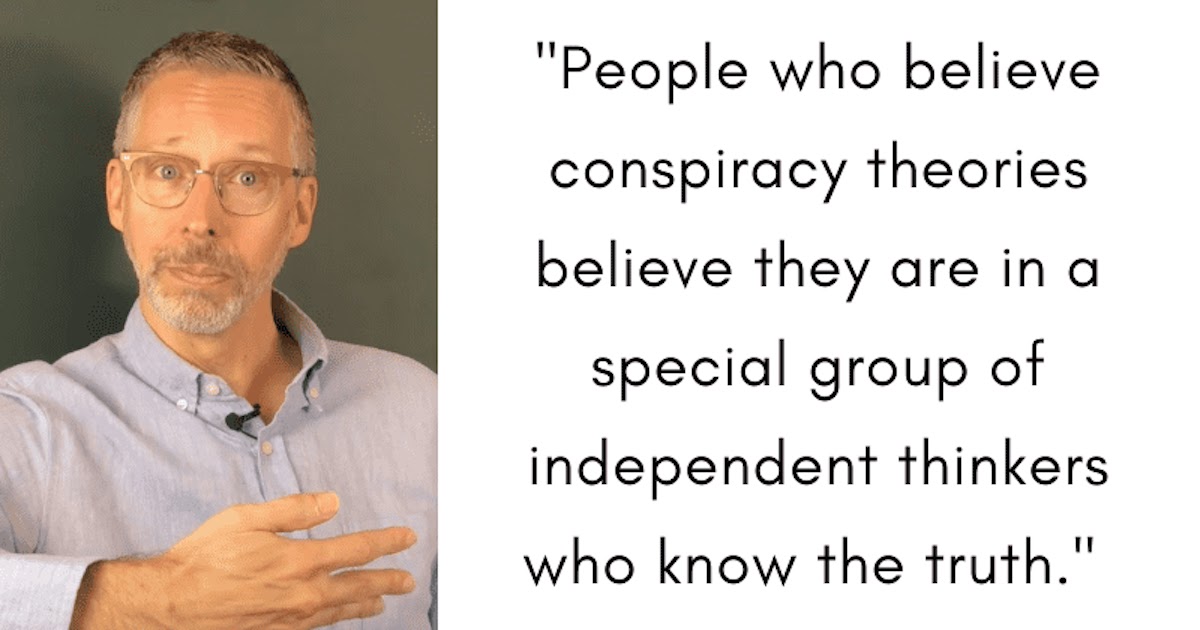
Photo by: Upworthy
In recent years, and particularly since the Covid-19 pandemic, conspiracy theories have been getting much more public attention. While conspiracy theories are nothing new, the modern uptick in conspiracy theories could be said to have started in recent times with the 9/11 attacks and widespread internet use, leading scared individuals to come into contact with others who shared their unusual beliefs, or those who pointed them in the direction of other conspiracies.
The question remains though as to why some people fall for conspiracy theories, particularly those theories that are completely implausible, such as believing that the Earth is flat, or that lizard people control the world.
David Hundsness, who holds a BA in Psychology from the University of California, has recently appeared on social media trying to explain why some people move towards conspiracies. He starts by saying:
"Have you ever wondered why so many people fall for conspiracy theories? In spite of all the evidence available, it's just weird that so many people choose to go with 'alternative' facts about COVID, vaccines, the 2020 election, the moon landing, and so on. And when you think about it, it's even weirder that they make this choice knowing that others are going to mock them and argue with them and call them stupid. So, why would anyone make that choice when it's so much easier to go along with the majority? They must be getting something out of that decision, so what is it?"
Hunsness goes on to say that there are four main reasons that conspiracies are fallen for.
Firstly, he says:
"One, is when there's a lack of information, a conspiracy theory fills in that missing gap of knowledge."
Secondly, he says:
"Two, is when something causes anxiety, a conspiracy theory helps you predict where that threat is coming from, so it doesn't feel so random."
Thirdly he says:
"Three, is wanting to follow your in-group. So if your political party or whatever believes a conspiracy, then you are more likely to believe it."
And fourthly, he says that ego is the major driver for a belief in conspiracy theories.
Hunsness explains:
"People who believe conspiracy theories believe they are in a special group of independent thinkers who know the truth. They think they have a superior knowledge while the majority of people are just sheep who are foolishly gullible and easily manipulated, and who wouldn't want to feel special. Let's start with an easy example. Imagine someone who wasn't particularly successful in school or their career. So deep down, their ego feels inferior. But if they believe the conspiracy theories, well, now they feel like they're smarter than most others, and a small group of people tell them so."
"Well, let's imagine someone who is well educated and has a professional career like a doctor. We've seen a few doctors take fringe positions against vaccines and masks. So why would they do that? Same reason. Ego. Maybe, before they felt like they weren't achieving the career success and recognition that they felt they deserved. But by supporting a firing conspiracy theory, suddenly they're invited to give their expert testimony. And their face is on national cable and a group of people are praising them as brilliant heroes. It is tempting, and for many people that praise and special feeling is worth the trade-off of other people ridiculing and insulting them. In fact, this ego boost is so important, it's the only common root of all conspiracy theories."
Hunsness also goes on to discuss how people may be moved away from conspiracy theories, suggesting:
"If they are to change, it has to be done in a way where they can save face. They have to be persuaded by someone from their in-group or at least someone neutral who isn't attacking or mocking them. And they don't want to hear 'I told you so.' They'd rather no one remembered that they ever believed such silly thoughts or even noticed that they changed their mind. It takes time and a lot of gentle repetition to counterbalance the sheer volume of misinformation they've consumed."
[Based on reporting by: Upworthy]













COMMENTS